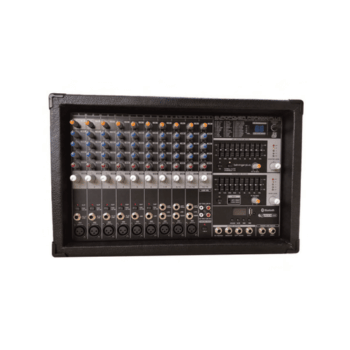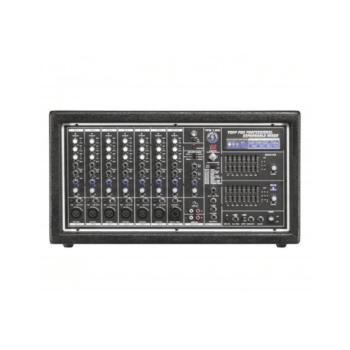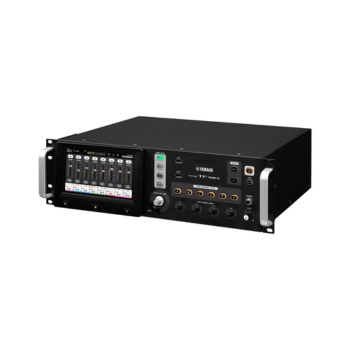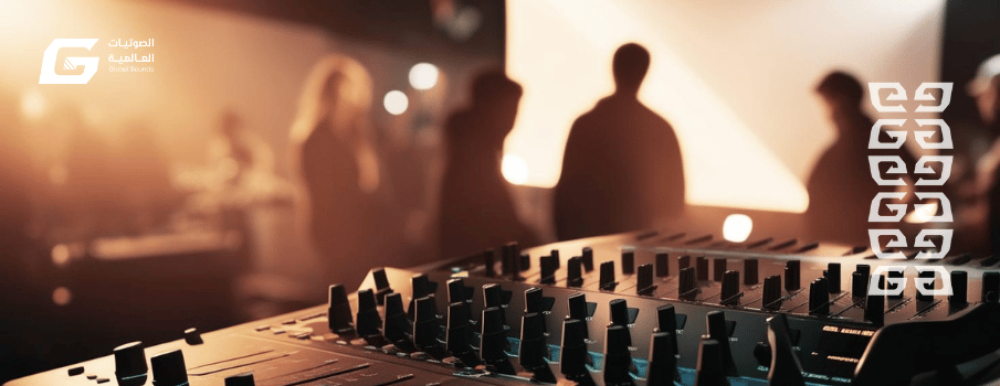introduction
A mixer is an essential component of any integrated audio system, especially in large spaces like mosques. A mixer adjusts and distributes sound appropriately, ensuring clarity and quality in all spaces. Whether you're setting up a sound system for a mosque or a religious event, choosing the right mixer is a crucial step toward achieving optimal audio performance. In this article, we'll explore the key features of mixers, the importance of each function, and how to choose the right mixer.
Features of the sound mixer
1. Precise volume control
The volume control allows you to fully control the volume, frequencies, and sound balance. With the volume control , you can adjust the sound to suit the needs of the space, helping to improve the clarity of the call to prayer or sermon inside the mosque.
2. Balanced sound distribution
The sound mixer can distribute sound evenly in large spaces, ensuring that the sound reaches every nook and cranny of the mosque or place where it is used.
3. Audio processing capability (DSP)
Many modern audio mixers feature digital sound processing (DSP), which ensures that the sound remains pure and clear without distortion. This feature helps improve sound quality, whether during the call to prayer or sermons.
4. Multiple microphone support
The mixer is capable of supporting multiple microphones simultaneously , making it easy to use in large mosques that need to distribute sound from multiple sources.
5. Ability to connect various audio systems
The audio mixer can connect speakers to multiple audio sources such as microphones, amplifiers, and recording devices , helping to perfectly coordinate the sound during events and occasions.
Behringer PMP2000 - 800W Portable Mixer with Multi-Effects Processor

Technical features of the sound mixer
1. Number of channels
A mixer is characterized by the number of channels it can handle. You should choose a mixer with a number of channels appropriate for the mosque's needs. If the mosque uses more than one microphone or audio source, a mixer with a sufficient number of channels should be chosen.
2. Control volume and frequency
The mixer provides volume control for each channel separately, as well as for different frequencies such as bass and treble , helping to customize the sound to suit the environment.
3. Support for digital audio technologies
Some modern audio mixers support digital sound enhancement (DSP) technologies, allowing the audio processor to fine-tune and precisely adjust the sound to the surrounding acoustic environment.
4. Wireless connection
Some sound mixers are available with wireless connectivity options, allowing remote control of the sound system, which is useful in large mosques where direct access to the mixers may be difficult.
5. Noise resistance
Some audio amplifiers feature noise-cancelling technologies, which help reduce distortion and audio interference, which is especially important in places like mosques that may contain external noise.
2000W mixer with 8 inputs and reverb

Uses of sound mixer
- Adhan : The sound mixer helps improve the clarity of the Adhan and raise its volume evenly throughout the mosque.
- Sermon : The sound mixer ensures even and clear sound distribution during the sermon, even in the back rows of the mosque.
- Religious occasions : The mixer is an ideal tool for organizing sound at religious occasions such as lectures or seminars.
- Congregational Prayer : Improving the sound during congregational prayer, especially in large mosques, to ensure that the sound reaches all attendees.
Tips for Choosing a Sound Mixer
1. Determine the number of channels required.
Make sure you choose a mixer with the appropriate number of channels for the number of microphones or audio devices you will be using. If you are using more than one microphone, you must have a mixer with a sufficient number of channels.
2. Search for audio nuts with modern technology.
Choose a sound mixer that supports modern technologies such as digital audio (DSP) to provide high-quality, clear sound, as well as noise-cancelling technologies.
3. Choose a crusher that is easy to use and maintain.
The mixer should be easy to use, especially if it will be used by non-audio professionals. Look for mixers with a simple, easy-to-understand user interface.
4. Find wireless connectivity options
If you need flexible sound control from long distances, choose a mixer that has wireless connectivity .
Yamaha TF Series 16-Input 40-Channel Professional Digital Mixer

Multimedia suggestion
- Photos : A picture of a sound mixer installed in a mosque with a view of the microphones and connected sound systems.
- Video : Demonstration of the process of installing and using a sound suppressor in a mosque.
- Infographic : Comparison of different types of sound amplifiers and their uses in mosques.
conclusion
A subwoofer is an essential part of any mosque's audio system. By choosing the right subwoofer, you can ensure that sound is delivered clearly and evenly throughout the mosque. Whether you're using it for the call to prayer, sermons, or religious events, a subwoofer gives you complete control over the sound, enhancing the worshipper's experience. Browse our collection of subwoofers today to ensure outstanding audio performance in your mosque.
Meta Description:
Explore mosque sound mixers that provide precise sound control with modern technologies like DSP for even sound distribution within the mosque.
Suggested topics for other articles :

